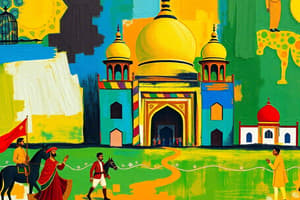Podcast
Questions and Answers
ईस्ट इंडिया कंपनीने मुख्यत: कोणत्या उत्पादनांसाठी तातडीने प्रारंभ केला?
ईस्ट इंडिया कंपनीने मुख्यत: कोणत्या उत्पादनांसाठी तातडीने प्रारंभ केला?
- निळ
- बिसल (correct)
- मिटाळ
- गोळा
कोंपनी कसे भारताच्या बहुमूल्य भूमीकंपन्यांवर मिळवून, त्यांचा कार्यक्षेत्र कसा वाढला?
कोंपनी कसे भारताच्या बहुमूल्य भूमीकंपन्यांवर मिळवून, त्यांचा कार्यक्षेत्र कसा वाढला?
- प्राचीन उत्पादन प्रणालींची सुरक्षा करून
- राजकीय संघर्षांने
- वनस्पती प्रेषकांच्या समर्थनाने
- स्थानिक शासकांना पराभूत करून (correct)
कोंपनीने आपल्या शासकीय संप्रेषणाच्या महत्त्वाच्या जयप्रद समर्थनाने कोणत्या कालावधीत 'महान' भारतीय प्रदेशांस व्यवस्थेच्या मुख्य संपत्तिस्थलींवर पूर्ण राजी केले?
कोंपनीने आपल्या शासकीय संप्रेषणाच्या महत्त्वाच्या जयप्रद समर्थनाने कोणत्या कालावधीत 'महान' भारतीय प्रदेशांस व्यवस्थेच्या मुख्य संपत्तिस्थलींवर पूर्ण राजी केले?
- हि
- 18
- 15
- 19 (correct)
ब्रिटिश शासन होण्यामुळे आजच्या भारतावर कोणती मोहक परिस्थिति सुरू झाली होती?
ब्रिटिश शासन होण्यामुळे आजच्या भारतावर कोणती मोहक परिस्थिति सुरू झाली होती?
'महान' महत्त्वपूर्ण संप्रेषण, 18-19 शतक कसे होते?
'महान' महत्त्वपूर्ण संप्रेषण, 18-19 शतक कसे होते?
'महान' महत्त्वपूर्ण संप्रेष****न, 20-21 सु. कसे होते?
'महान' महत्त्वपूर्ण संप्रेष****न, 20-21 सु. कसे होते?
महात्मा गांधीने कोणत्या धर्मासाठी लोकांना स्वतंत्रतेसाठी एकत्रित करण्याच्या मार्गदर्शनात आणले?
महात्मा गांधीने कोणत्या धर्मासाठी लोकांना स्वतंत्रतेसाठी एकत्रित करण्याच्या मार्गदर्शनात आणले?
महात्मा गांधीने १९१९ मध्ये कोणत्या कायद्याविरुद्ध आंदोलन सुरू केले?
महात्मा गांधीने १९१९ मध्ये कोणत्या कायद्याविरुद्ध आंदोलन सुरू केले?
सुभाष चंद्र बोसने कुत्रं सेनेची स्थापना केली?
सुभाष चंद्र बोसने कुत्रं सेनेची स्थापना केली?
'सत्याग्रह' म्हणजे कोणता?
'सत्याग्रह' म्हणजे कोणता?
'आॅलिड सेनेस'ने सुमोरले -'
'आॅलिड सेनेस'ने सुमोरले -'
'Azad Hind Fauz' कोणता होता?
'Azad Hind Fauz' कोणता होता?
Flashcards are hidden until you start studying
Study Notes
Introduction
Modern Indian history is shaped by two major events - British colonial rule and the subsequent struggle for independence. This period began with the arrival of European traders in the late 15th century, which eventually led to the establishment of political control over large parts of India by Great Britain. In this article, we will delve into these pivotal moments that have had lasting impacts on present-day India.
British Colonial Rule
The East India Company was initially established to trade spices, silk, indigo, and saltpeter in Bengal. However, over time, the company gained considerable power through its military victories against local rulers and expanded its territorial control beyond trading interests. By the early 19th century, it effectively ruled vast swathes of India on behalf of the British crown.
British control brought significant changes to every aspect of life in India, from agriculture and education to legal systems and land taxation. Some of these reforms were beneficial, such as improvements in transportation infrastructure and public health initiatives like vaccination programs. However, others resulted in hardships for the Indian population, including restrictions on traditional industries and the imposition of new taxes.
One of the most far-reaching changes introduced by British rule was the partition of India based on religion, creating separate Muslim majority provinces in India and Pakistan. While this move aimed to address communal tensions between Hindus and Muslims within the subcontinent, it ultimately contributed to further polarization and conflicts that persist today.
In summary, British colonialism left an enduring impact on Indian society, introducing both economic development and social upheaval. Many aspects of modern Indian culture are rooted in adaptations to the foreign domination experienced during this era.
Indian Independence Movement
As dissatisfaction grew among Indians under British rule, various movements emerged seeking self-determination and national sovereignty. These included advocates for nonviolent resistance, such as Mahatma Gandhi, as well as those who favored more aggressive methods, like Bal Gangadhar Tilak.
Mahatma Gandhi's philosophy of satyagraha (nonviolent civil disobedience) played a crucial role in mobilizing people across class, caste, and religious affiliations towards the fight for freedom. His campaigns against the Rowlatt Act in 1919 and later against British policies in South Africa laid the foundation for his leadership in the Indian National Congress (INC), the primary organization leading the independence movement.
Another important figure in the struggle for independence was Subhash Chandra Bose, who formed the Azad Hind Fauz, also known as the Indian National Army (INA). Consisting largely of soldiers taken prisoner after Japanese invasion of Southeast Asia during World War II, INA fought alongside Japan against the Allied forces in Burma. Although their efforts were ultimately unsuccessful, they continued to inspire many as symbols of resistance against British imperialism.
Eventually, the sustained pressure from these and other independent groups forced the British government to acknowledge India's desire for self-governance. On August 15, 1947, following negotiations between INC leaders Jawaharlal Nehru, Mohammad Ali Jinnah, and V.P Menon, India officially became independent. However, this event was accompanied by widespread violence and mass migration - the infamous Partition, which saw millions killed or displaced.
Despite the tumultuous process of decolonization, India's emergence as an independent nation marked the beginning of a new era in global politics. It set precedents for similar struggles around the world while challenging Western perceptions of 'civilized' societies being able to colonize 'unsettled' ones without repercussions.
Conclusion
From currying favor with local rulers through trade to negotiating political autonomy after decades of resistance, the journey of post-colonial India has been complex and multifaceted. The legacy of British colonialism continues to shape contemporary issues ranging from regional disputes to international relations. As India navigates its past, it does so knowing that its future lies firmly in its own hands.
Studying That Suits You
Use AI to generate personalized quizzes and flashcards to suit your learning preferences.





